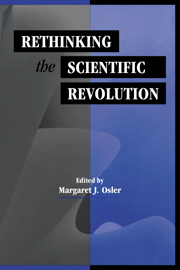3 - The Scientific Revolution Reasserted
Published online by Cambridge University Press: 25 October 2009
Summary
I find myself in an ambiguous pose that I need to explain before I continue. I did more than count Betty Jo Dobbs as my friend. Rightly or wrongly, I regarded myself as her earliest admirer in the discipline – after her graduate professors, to be sure. We got into correspondence, first about Newton's handwriting, and then about his alchemical papers, while she was still a graduate student, and as a consequence I read her dissertation chapter by chapter as she completed each one. I wrote enthusiastically to Northwestern in support of her first appointment, and I continued to write whenever she needed a reference. I feel her loss both personally and professionally. For all that, I am going to devote this chapter, written in her memory, to taking issue with the last piece she published, her History of Science Society Lecture, “Newton as Final Cause and First Mover.” Anyone who knew Professor Dobbs understood that you did not take a high tone with her. Neither do I here, even when there is no possibility of a retort. You also understood that she took the intellectual life seriously and thought that important issues required thorough discussion. I can do no better service to her memory than to take the issues she raised seriously and, in a low voice, to contribute what I can to their elucidation. The issues concern the Scientific Revolution, and I intend to make that topic, rather than details of Dobbs's essay, my focus.
- Type
- Chapter
- Information
- Rethinking the Scientific Revolution , pp. 41 - 56Publisher: Cambridge University PressPrint publication year: 2000
- 6
- Cited by



